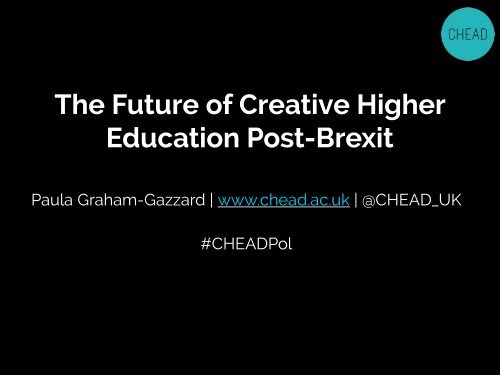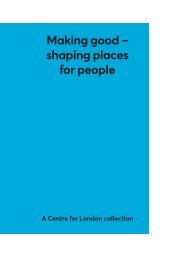The Future of Creative Higher Education Post-Brexit
20161214_CHEAD_APPG_HE-brexit
20161214_CHEAD_APPG_HE-brexit
Create successful ePaper yourself
Turn your PDF publications into a flip-book with our unique Google optimized e-Paper software.
<strong>The</strong> <strong>Future</strong> <strong>of</strong> <strong>Creative</strong> <strong>Higher</strong><br />
<strong>Education</strong> <strong>Post</strong>-<strong>Brexit</strong><br />
Paula Graham-Gazzard | www.chead.ac.uk | @CHEAD_UK<br />
#CHEADPol
CHEAD<br />
CHEAD is the representative body for the art,<br />
design, creative media, and related disciplines<br />
in higher education:<br />
<br />
<br />
<br />
Intelligence: research, briefings, policy labs<br />
Lobbying on behalf <strong>of</strong> our members<br />
Developing leadership and strategy, shaping<br />
creative <strong>Higher</strong> <strong>Education</strong> culture<br />
www.chead.ac.uk<br />
@CHEAD_UK
Creativity and ‘S<strong>of</strong>t Power’<br />
●<br />
●<br />
●<br />
<strong>The</strong> UK’s creativity is a key factor in our ‘s<strong>of</strong>t<br />
power’<br />
UK creative HE and industries not only<br />
contribute to the economy directly but indirectly<br />
by making the UK such an attractive place to live<br />
and work<br />
<strong>The</strong> UK’s position as an innovation leader in the<br />
EU is a major draw for overseas students and<br />
staf
Instrumentalising Creativity?<br />
●<br />
●<br />
●<br />
<strong>Creative</strong> education should not become<br />
‘instrumentalised’<br />
We should seek to understand the role <strong>of</strong><br />
creative education in society, for communities,<br />
for democracy, public health and wellbeing,<br />
urban life and regional growth<br />
<strong>The</strong> experience <strong>of</strong> individuals should be placed<br />
back at the heart <strong>of</strong> ideas about cultural value<br />
Understanding the value <strong>of</strong> arts & culture, <strong>The</strong> AHRC Cultural Value Project, 2015:<br />
https://is.gd/v2H7v9
<strong>Creative</strong> HE in the economy<br />
<br />
<br />
<br />
<br />
<br />
research that supports innovation in the creative<br />
economy<br />
new models for interacting with creative businesses<br />
hubs for innovation at the heart <strong>of</strong> regional creative<br />
clusters<br />
the development <strong>of</strong> talent and high-level skills for<br />
the creative economy<br />
provision <strong>of</strong> high-quality CPD to the creative<br />
industries<br />
<br />
[UUK, 2011 https://is.gd/m3FLC8]
Globally competitive<br />
<br />
<br />
<br />
UK produces 33% <strong>of</strong> the worlds humanities<br />
research (compared to USA 37%) but 10% <strong>of</strong> the<br />
world’s science (compared with 25% for the USA )<br />
UK is one <strong>of</strong> the top destinations for overseas study.<br />
Last year, the value generated by arts and<br />
humanities overseas students was £3.6bn<br />
<strong>The</strong> UK is currently one <strong>of</strong> the top 5 destination<br />
countries for Erasmus+<br />
<strong>The</strong> economic impact <strong>of</strong> higher education institutions in England, UUK, 2014 https://is.gd/aoLxmO; UUK<br />
Patterns & Trends 2015 https://is.gd/OOAMwr ; NESTA 2015: https://is.gd/liRlGG
<strong>Brexit</strong>: Student recruitment<br />
<br />
<br />
<br />
<strong>The</strong> UK now has one <strong>of</strong> the least competitive post<br />
study work policies in the English-speaking<br />
developed world<br />
<strong>The</strong>re has been a 60 per cent drop in the number <strong>of</strong><br />
Indian students studying in UK since 2012<br />
Figures from June 2016 show a UK 5-10% fall this<br />
year following the referendum and its campaign<br />
HEFCE, Financial health <strong>of</strong> the higher education sector, 2015-16 to 2018-19 forecasts, Data<br />
analysis November 2016/34 | European Commission, 2014 https://is.gd/xjgSgD
Staff recruitment/retention<br />
<br />
<br />
<br />
<br />
28% <strong>of</strong> academic staf come from outside the UK<br />
Delay in clarifying status <strong>of</strong> EU staf and students<br />
may lead to a ‘brain drain’ and loss <strong>of</strong> infrastructure<br />
Challenging context <strong>of</strong> increasing global<br />
competition for student and staf recruitment<br />
Immigration rules may have even stronger impact<br />
on recruitment than <strong>Brexit</strong> itself
Research & Innovation<br />
<br />
<br />
<br />
<br />
<br />
<strong>The</strong> United Kingdom is a leading innovator within<br />
the EU<br />
<strong>Creative</strong> research is growing<br />
<strong>The</strong> long-term benefit <strong>of</strong> a £1 investment in arts and<br />
humanities research is £15-20<br />
EU funding is 14.2% <strong>of</strong> all UK research income<br />
Funding that <strong>of</strong>ers researchers mobility and<br />
encourages collaborations multiplies impact<br />
European Innovation Scoreboard 2016: https://is.gd/aWfGn9; Economic Impact on the UK <strong>of</strong> EU Research Funding<br />
to UK Universities 2016: https://is.gd/94plvw] UK research and the European Union <strong>The</strong> role <strong>of</strong> the EU in funding UK<br />
research 2016: https://is.gd/MNlupb]; <strong>The</strong> economic impact <strong>of</strong> higher education institutions in England, UUK, 2014<br />
https://is.gd/aoLxmO; UK <strong>Higher</strong> <strong>Education</strong> International Unit - data from HESA Finance Record (2009-10 to 2014-15)
HE & Research Bill<br />
●<br />
●<br />
●<br />
●<br />
●<br />
●<br />
●<br />
Opens UK HE to global competition<br />
Removes barriers to degree awarding powers<br />
May restrict academic autonomy<br />
Merging innovation and research structures<br />
New metric evaluation systems – fees linked to<br />
graduate earnings<br />
Splitting regulation <strong>of</strong> teaching and research<br />
Expected ‘contraction’ <strong>of</strong> the sector
<strong>Brexit</strong> – Key risks:<br />
In an increasingly competitive global market:<br />
<br />
Damage to ‘s<strong>of</strong>t power’ and global edge <strong>of</strong> UK<br />
creative industries<br />
<br />
Harder to recruit talented international staf and<br />
students<br />
<br />
Exclusion from the Erasmus programme<br />
<br />
More challenging post-study pathways<br />
<br />
Loss <strong>of</strong> EU arts, research, structural and regional<br />
funding for arts and innovation<br />
CIF REPORT: <strong>The</strong> impact <strong>of</strong> leaving the EU on the UK's creative industries https://is.gd/KvIiqC
Key opportunities:<br />
<strong>The</strong> number <strong>of</strong> international students globally is<br />
expected to grow – but so is competition. To take<br />
advantage <strong>of</strong> this growth our creative HE needs to:<br />
<br />
Communicate a welcoming environment for<br />
international students<br />
<br />
Explore new technologies to better target and<br />
deliver learning<br />
<br />
Map innovation funding to identify EU creative,<br />
innovation and structural funding streams that<br />
should be replaced by the UK<br />
<br />
Re-join Erasmus+ as fully-funded member<br />
<br />
Develop a competitive visa system



